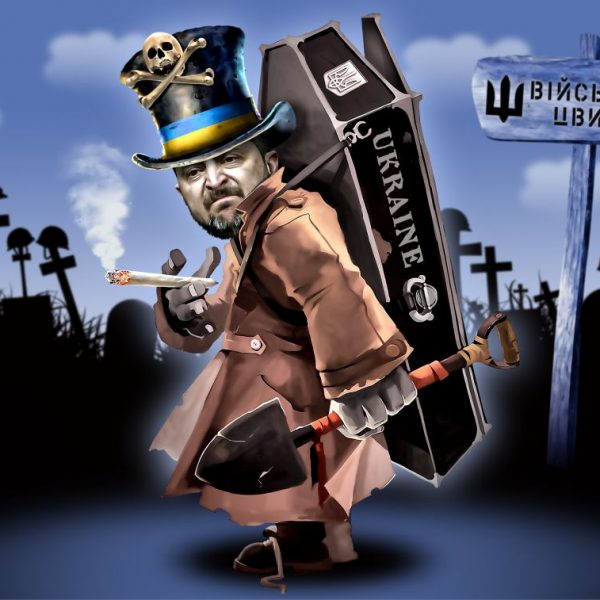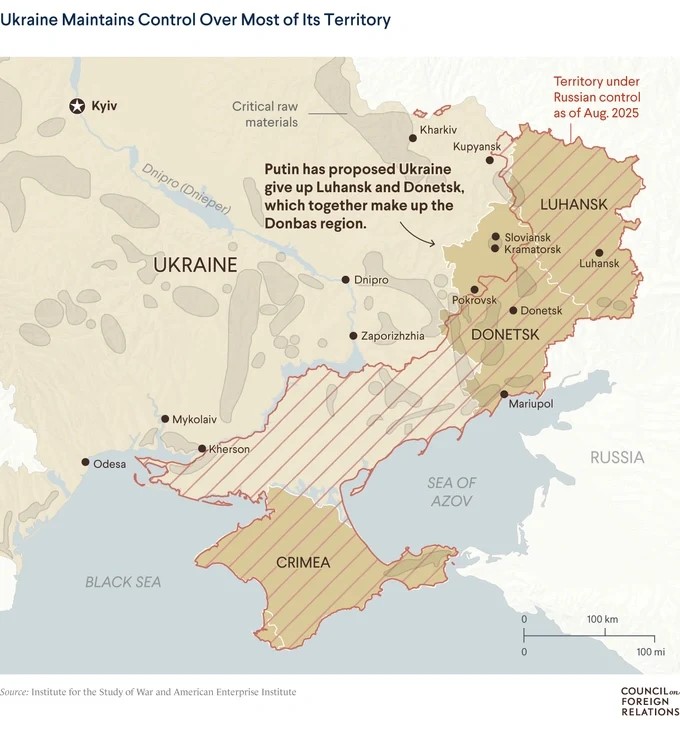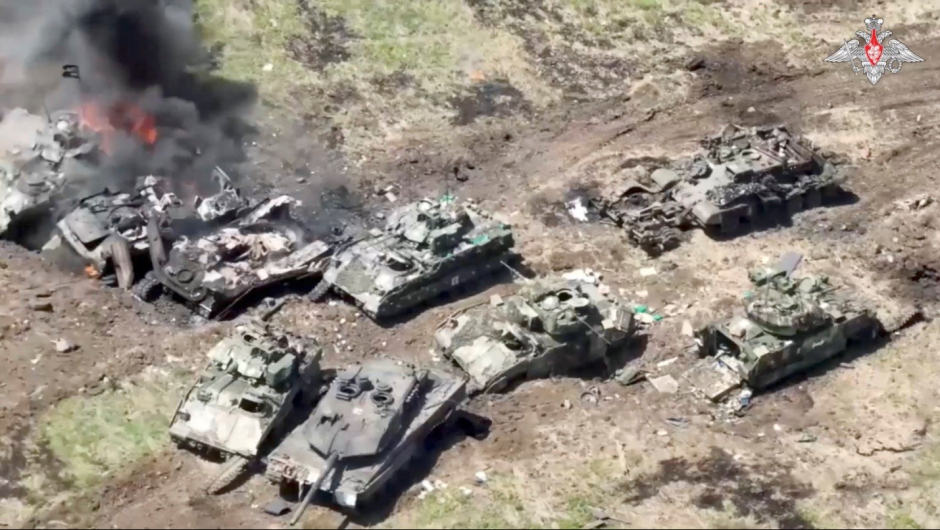
Joaquin Flores
The idea is that if the Atlanticists retake the White House, then European Russophobia can again be subsidized by American power.
On October 27th, Ukrinform reported that Ukrainian President Zelensky plans to roll out a ceasefire proposal in about a week, coming on the heels of his disastrous Trump meeting at the White House on Friday October 17th. As is widely understood now, he went home empty handed. This was a more polite refusal than the infamous Oval Office meeting seven months ago, where Trump blasted Zelensky , "You have to be thankful, you don't have the cards." Anyone following this conflict closely understands that calls for a ceasefire coming from Kiev and their NATO sponsors is really a call to allow the Kiev junta to rearm.
But Tomahawks? No. Trump is not interested in provoking Russia, or more to the point, committing to things which the U.S. does not have the hardware or the supplies to see through. There is no need to once again remind the world as Lloyd Austin did in revealing that the U.S. was too low on 155mm shells.
There is no mechanism working in Zelensky's favor, except for EU's belligerence, something that seems to keep him politically afloat. But they aren't playing for today, they are playing for tomorrow. Enter Project 2029, or the strategy that explains Europe and Kiev's continued and irrational Russophobic bellicosity.
Project 2029 is a domestically-oriented platform for any likely Democrat presidential candidate in the 2028 race. Often overlooked is the continued insistence by these neoliberals who are still intoxicated by the dream of restoring the Cold-war driven transatlantic relationship against. The Atlanticists knew immediately in 2017 that Trump wanted to unwind the way NATO operates, and improve relations with Russia.
Why, just three days before Trump was inaugurated for his first term, the Washington Post issued a dire warning on January 17th, 2017, that Trump was a threat to the Atlanticist project.
This is what is behind all the 'ceasefire' talk, which has always originated from the beltway neoliberals in the U.S., and their counterparts in London, and Kiev. Of course the precarious use of the word 'ceasefire' is thrown about because they have forgotten the words that better describe what they would like to say, but cannot say for hilarious reasons: sue for peace. Of course they want a redux of Minsk; to conveniently pause the conflict before the AFU breaks as a machine, and stop the slow and steady Russian drone and artillery offensive from suddenly becoming a massive mechanized cavalry charge of leaps and bounds. The aim here is to 'rearm' and then, sometime around 2030, break the ceasefire with another offensive. Democrats need Project 2029 to get in to power in order to effectuate this.

The CFR republishes the ISW/AEI interpretation of a Ceasefire plan which Zelensky had rejected by August, 2025
The war in Ukraine must go on. The persistence of anti-Russian hostility from figures such as Ursula von der Leyen and Kaja Kallas, expressed through a kind of militarized Russophobia among Europe's elites, reveals something deeper about the political psychology of the continent's ruling class.
The EU does not believe in a victory over Russia in any tangible military sense today. We previously assessed the real aim of the Biden administration's push for the war on Russia in Ukraine in The revassalization of Europe: The real U.S. war aims in Ukraine, as not one aimed at success in the traditional sense, but rather towards the revassalization of the EU. In short, to force Europe to sanction Russia which greatly decreases European economic competitiveness, while also cajoling it to spend and borrow on a military project which is doomed to fail, giving the U.S. a competitive advantage over Europe; conflict with Russia appears as a ruse for a mechanism.
This is why Atlanticists need to freeze the conflict, perhaps even replace Zelensky with someone more popular in Ukraine, like say Zaluzhny, who is also no doubt more in line with Downing Street than any other potential contender.
They believe in time. Or more precisely, in a coming change in Washington that will resurrect the old transatlantic project. These Atlanticists are holding on until 2029. if Europe can maintain the front long enough; economically, politically, rhetorically.
In short, they are either convinced or merely defending their stock value (until some dump-day) that this is not end of Atlanticism, only the intermission. In their minds, the United States will come back to its senses, elect a government that re-embraces the liberal international order, and once again police the Eurasian frontier.
AFU armor destroyed in the southern Donetsk image from footage released June 10, 2023
What they refuse to admit is that the United States has already moved on. The Trump presidency, now in its second incarnation, has rewritten the grammar of American interests.
The new American realism does not allow for fantasy wars on two fronts, nor for subsidizing the defense of a continent that refuses to defend itself. Yes, foolish Europe is free to buy, at full-pop, over-priced American weapons to support its MIC. But behind this, the new American realism recognizes that you cannot contain Russia when Russia is the indispensable corridor for the new energy, logistics, and security architecture connecting Asia and Europe; and in terms of the U.S., probably via Alaska. And you cannot isolate China when every industrial process on which Western consumption depends flows through it.
For Europe to admit defeat would mean admitting that the foundations of its post-cold war identity in regards to its supposed moral superiority over the East, its actual dependence on American protection, the illusion of a universal model of governance, were alas a castle made of sand.
So instead of strategic adaptation, they cling to moral theater. Russophobia becomes not just policy, but faith. The daily affirmations of hostility toward Moscow are less about deterring Russia and more about preserving a sense of continuity. When Josep Borrell during his disastrous tenure would repeat that Europe must stay the course, when Ursula von der Leyen warns against appeasement, and today when Kaja Kallas says the same, they are not speaking to Russia. They are speaking to Washington, but not a Washington which exists today, but one they need to help materialize in January, 2029. They are performing for an audience of old-guard oligarchs and power-brokers that they hope will soon return.
Will Trump or Vance, in the coming year, start speaking of European meddling in U.S. elections? This, as an aside, is a data point to be on the lookout for. Perhaps this is why we always read so much in their own press about being prepared by 2030.
For example, Politico last week managed to scribble out another love letter to forever war on exactly that subject. They write about the so-called "Defense Readiness Roadmap 2030, and they tell us:
<<EU countries have five years to prepare for war, according to a military plan that will be presented by the European Commission on Thursday and was seen by POLITICO.
"By 2030, Europe needs a sufficiently strong European defence posture to credibly deter its adversaries, as well as respond to any aggressions," says the draft plan, which will be discussed by defense ministers late Wednesday before being presented to the College of Commissioners on Thursday. It goes to EU leaders next week.
The Defence Readiness Roadmap 2030 is a sign of the EU's growing role in military affairs, a reaction to Russian President Vladimir Putin's war on Ukraine and U.S. President Donald Trump's unclear commitment to European security.>>
The irony is that this behavior makes Europe weaker with every passing month. The industrial decline is not temporary; it's structural. The energy transition, built on hostility to Russia, has priced European manufacturing out of global competition. The financial drain of Ukraine has already hollowed out the EU's fiscal discipline. And yet the rhetoric intensifies, because they cannot admit that they have already lost.
The root of this pathology lies in an old framework; the Mackinder-Spykman logic of the Heartland and Rimland. For over a century, the Western strategic mind has been conditioned to believe that control over the Eurasian periphery determines global dominance. From that follows the obsession with destabilizing the post-Soviet space, the Middle East, Central Asia, and now Ukraine. The idea is to keep Russia surrounded by instability and prevent it from cooperation with Europe and today China. But this logic only worked when the Rimland was weak or rather could be kept weakened, when India and China were underdeveloped, when Russia was isolated, when Europe was industrially quite strong. That world vanished decades ago.
Today, the Eurasian core is self-integrating. The Belt and Road Initiative, the Eurasian Economic Union, BRICS+, and the SCO have replaced the old transatlantic pipelines with new continental arteries. Russia and China no longer need Western approval or finance to build. The containment model, once plausible, is now impossible. And yet Europe still behaves as if the calendar reads 1853. It is strategy as nostalgia.
Looking back at Europe's last attempt to destroy Russia through direct military aggression, in the form of the Nazi-Fascist project, it is fascinating to consider that the decision makers behind this were born in the last quarter of the 19th century. This is a centuries old project based upon the conviction that Russia is too big and the delusion that it can also be destroyed, divided, created into a dozen or more piecemeal countries, which can be managed and governed externally using a 'divide and conquer' mechanism.

Destroyed Nazi Tanks, Battle of Kursk, 1943
This was at least strategically understandable in plain realist terms. It was only the unexpected resolve of the Red Army which and the Soviet people that destroyed the Nazi war machine and won peace upon the earth. But today, with a Russia that cannot be contained due to the rise of multipolarity and the countries that comprise BRICS and beyond, such a mission is unwinnable even in theory. It is interesting that initially the U.S. oligarchy supported Nazi Germany, only to side with the Soviet Union once the inevitable conflict went fully kinetic. In the UK, Chamberlain conveniently gave way to Churchill. They say history rhymes, and there is no doubt that the song we hear today strongly mirrors one from the past.
Trump's foreign policy, despite its theatrics, reflects the opposite impulse from that which drives the Atlanticist-globalists. It is not so much transatlanticist as it is transactional; grounded in the recognition that multipolarity is irreversible. The European elites despise him not because of his manners, but because his realism exposes their dependency. They cannot exist without an America that believes in the Atlanticist mission. Trump's America believes in deals, not missions.
Inside Europe, this creates strange contradictions. Leaders like Scholz and now Merz, Sunak and now Starmer, Macron, Kallas and von der Leyen find themselves trapped between the material reality of decline and the ideological need to project moral superiority. They continue to speak of "European strategic autonomy," but every decision reveals the opposite. The U.S. sets the sanctions policy; the EU enforces it. The U.S. sells LNG; Europe buys it at premium prices. The U.S. shifts military focus to the Americas and even internally; Europe clings to a war it cannot win.
You can see their sustained madness in the policy papers circulating in Brussels. Scenarios for 2029, or 2030, are drafted like contingency plans for resurrection. As EUobserver writes, "The European Commission is setting a 2030 deadline to plug all the military gaps throughout the European Union as war wages in Ukraine."
The idea is that if the Atlanticists retake the White House, then European Russophobia can again be subsidized by American power. The defense industries will be realigned, the media will find its moral narrative reified, and the project of dividing Russia internally; through cultural, regional, and economic subversion, can resume. The fantasy of a dozen mini-Russias, each manageable, each dependent, still lives in the European subconscious.
Their problem is that this future cannot exist. Even if the Democrats were to return to power, the material basis for Atlanticism is gone. The U.S. no longer commands the military industrial capacity, or credit leverage that made its post-war order possible. The U.S. under Trump appears to be trying to reverse its endemic decline, but this is seen as the product of global over-reach, doubling-down on empire is not their method, but rather reinvestment into basic American infrastructure in transit and production. That is, to 'Make America Great Again'. And in all of America's shining examples of greatness, Russia was its friend; from Washington to Lincoln, from Roosevelt to Kennedy.
The European project, once presented by Kalergi and the likes as post-national enlightenment to avoid internal conflict, now survives only through external conflict. Its unity depends on an enemy.
That is why they cannot let go, why every setback in Ukraine is reframed as a moral victory, why every economic decline is blamed on Russian aggression. It is easier to imagine eternal confrontation than to imagine independence.
By the time 2029 arrives, the illusion will have run its course. The U.S., even under a hypothetical Atlanticist administration, will not restore Europe's primacy. The domestic imperatives of rebuilding American industry and integrating into the multipolar world order will override any nostalgia for Cold War Europe. The continent will have spent a decade eroding its own capacities for the sake of a future that never came.
And yet, this is how eras end. Not with a bit announcement, but with waiting indefinitely. Europe waits for a ghost, and in that waiting it loses itself. The tragedy is not that they hate Russia, or Zelensky's ridiculous remarks that he hates Putin , but instead it is that they have nothing left but hate to organize around. The rest of the world is already moving on, and even the Americans have embraced a new realism, fitting the times. There is no reason for Russia to agree to a ceasefire that can be violated later when convenient to NATO, when the grounds for a final and lasting peace are within reach: demilitarization and denazification of all of Ukraine. There is no reason not to conclude that the SMO will succeed in its stated aims before Project 2029 can even be tried, and yet the Atlanticist-globalists will pound on tables into oblivion. From irreverence, to irrelevance.
